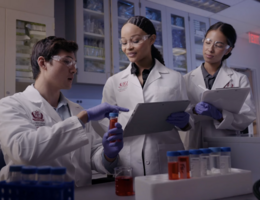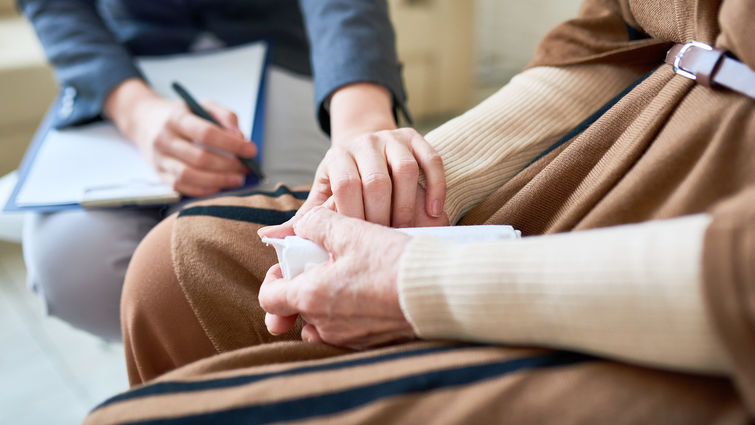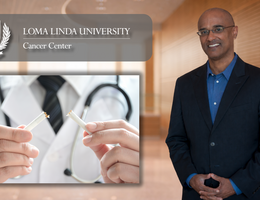

Receiving a cancer diagnosis requires you to grapple with life-changing information and come to terms with a new reality, kickstarting a grieving process. Because this grieving process varies from person to person, there is no one-size-fits-all method of coping with a new diagnosis, according to mental health clinicians at Loma Linda University’s Cancer Center and Behavioral Medicine Center (BMC) MEND Program.
“Everyone’s journey is different, and this journey is yours,” says Ashley Park, DMFT, AMFT, a clinical therapist at the BMC who works with patients facing chronic illness through the MEND program. “However you approach it, you are correct. There is no one way to approach this kind of experience.”
During the grieving process, you may cycle through a range of emotions, Park says, including fear, sadness, anger, denial, confusion, shock, feeling overwhelmed, and acceptance. For instance, Park says patients who feel blindsided by their diagnosis may express a mixture of shock and confusion through responses along the lines of: “I can’t believe this is happening to me,” “I thought I did everything right and ate healthily,” and “What did I do wrong?”
Give yourself permission to experience those emotions as they arise because they are valid and true.Ashley Park
In other cases, Park says patients may experience anger. For example, she says those who have received a terminal diagnosis of cancer at a late stage, or advanced cancer, may be angry that it wasn't detected earlier. Anticipatory grief — a feeling of grief before an impending loss — is another common emotional response to a new diagnosis, Park says.
“When you’re newly diagnosed with cancer, you can’t help but think of everything that will come with it,” Park says. “You may grieve your old life and what a new reality will look like or what your family might have to go through.”
What's important to remember is that these emotional responses to a new diagnosis are normal, Park says, and there is no pressure to rush to acceptance as you process the diagnosis. Even after patients have reached some form of acceptance, Park says the difficult emotions of sadness or grief don’t just vanish. She says she encourages you to “honor the emotion,” whatever it may be, as a natural and realistic response to their experience.
“Give yourself permission to experience those emotions as they arise because they are valid and true,” Park says.
Part of acceptance can look like taking control of the options and decisions you still have in your life and focusing on what is meaningful to you, says Gina Morales, LCSW, a clinical social worker at LLU Cancer Center.
There is no one formula, no single prescribed way to cope with a new diagnosis for cancer.Gina Morales
She says this will look different for everyone, from maintaining essential relationships with friends and family to engaging in physical activity or traveling.
“I empower patients to practice self-determination in whatever way makes the most sense for their circumstance," says Morales.
Morales says she also encourages you to take an active role in your care and participate in informed decision-making by understanding the diagnosis and maintaining strong communication with care teams. Connecting — even just once — with a counselor and social worker on the care team can also help you cope with a diagnosis and learn about the available supportive resources, Morales says. Joining a support group is another way Morales says you can learn from others’ experiences and means of coping in a supportive space.
“When you’re in a supportive setting, you really feel that you’re not alone on the journey,” Morales says. “You can learn how others are going through something similar, how it worked out for them, things to look for, or what questions to ask. It’s just another tool to help.”
Processing a new diagnosis and juggling communications with multiple care team members — pharmacists, nurse navigators, oncologists, schedulers, etc. — can be overwhelming emotionally and physically, Morales says. She advises not to hesitate to reach out to mental health clinicians like her and Park, who are here to support patients through all aspects of their journey at any time.
“There is no one formula, no single prescribed way to cope with a new diagnosis for cancer,” Morales says. “Everyone is different, and it can be helpful to know about resources available to assist you in whatever way you need through your journey.”
To help patients navigate these challenges, Loma Linda University Cancer Center works with the Behavioral Medicine Center MEND Program to provide individuals with personalized, whole-person care for cancer through integrative mental and behavioral health services. To learn more about the resources offered to patients at the Cancer Center, visit lluh.org/cancer-center or call 1-800-782-2623.

